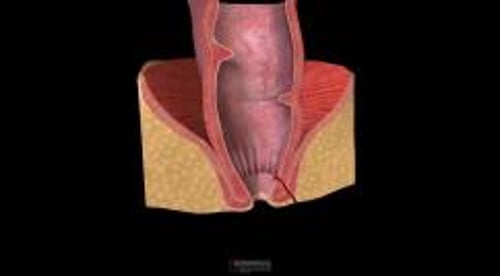An anorectal fistula is an abnormal channel that leads from the anus or rectum usually to the skin near the anus but occasionally to another organ, such as the vagina.
Anorectal fistulas are common among people who have an anorectal abscess, Crohn disease, or tuberculosis.
Anorectal fistulas can cause pain and produce pus.
The diagnosis is based on an examination and other viewing techniques.
Treatment may involve surgery, but some less invasive alternatives exist.
The rectum is the section of the digestive tract above the anus where stool is held before it passes out of the body through the anus.
The anus is the opening at the end of the digestive tract where stool leaves the body.
(See also Overview of the Anus and Rectum.)
Most fistulas begin in a deep gland in the wall of the anus or rectum. Sometimes fistulas occur after drainage of an anorectal abscess, but often the cause cannot be identified. Fistulas are more common among people with Crohn disease or tuberculosis. They also occur in people with diverticulitis, cancer, or an anal or rectal injury. A fistula in an infant is usually a birth defect and is more common among boys than girls.
Fistulas that connect the rectum and vagina (called rectovaginal fistulas) may result from radiation therapy, cancer, Crohn disease, or an injury to the mother during childbirth.
Symptoms of Anorectal Fistula
An infected fistula may be painful and may discharge bloody pus.
Diagnosis of Anorectal Fistula
A doctor's evaluation
Sometimes anoscopy, sigmoidoscopy, or colonoscopy
A doctor can usually see one or more openings of a fistula or can feel the fistula beneath the surface.
A probe may be inserted to determine a fistula's depth and direction. By looking through an anoscope (a short, rigid tube) inserted into the rectum and exploring with the probe, the doctor may locate the internal opening of the fistula. Inspection with a sigmoidoscope (see Endoscopy), which is a much longer viewing scope, also helps the doctor locate the internal opening of the fistula and determine whether the problem is being caused by cancer, Crohn disease, or another disorder. Colonoscopy is done if the doctor suspects Crohn disease (see diagnosis of Crohn disease).
Treatment of Anorectal Fistula
Surgical procedures
For fistulas caused by Crohn disease, medications
Surgery to open the fistula (fistulotomy or fistulectomy) is sometimes done. During surgery, sometimes the sphincter is partially cut. If too much of the sphincter is cut, the person may have difficulty controlling bowel movements.
Alternative treatments include advancement flaps (flaps of lining from the rectum or anus are stretched over the opening of the fistula), biologic plugs, fibrin glue instillations, and other procedures to close the fistula tract.
If the person has diarrhea or Crohn disease, surgery usually is not done because there may be delayed wound healing and fecal incontinence.
Medications used to treat Crohn disease can help a fistula close.




